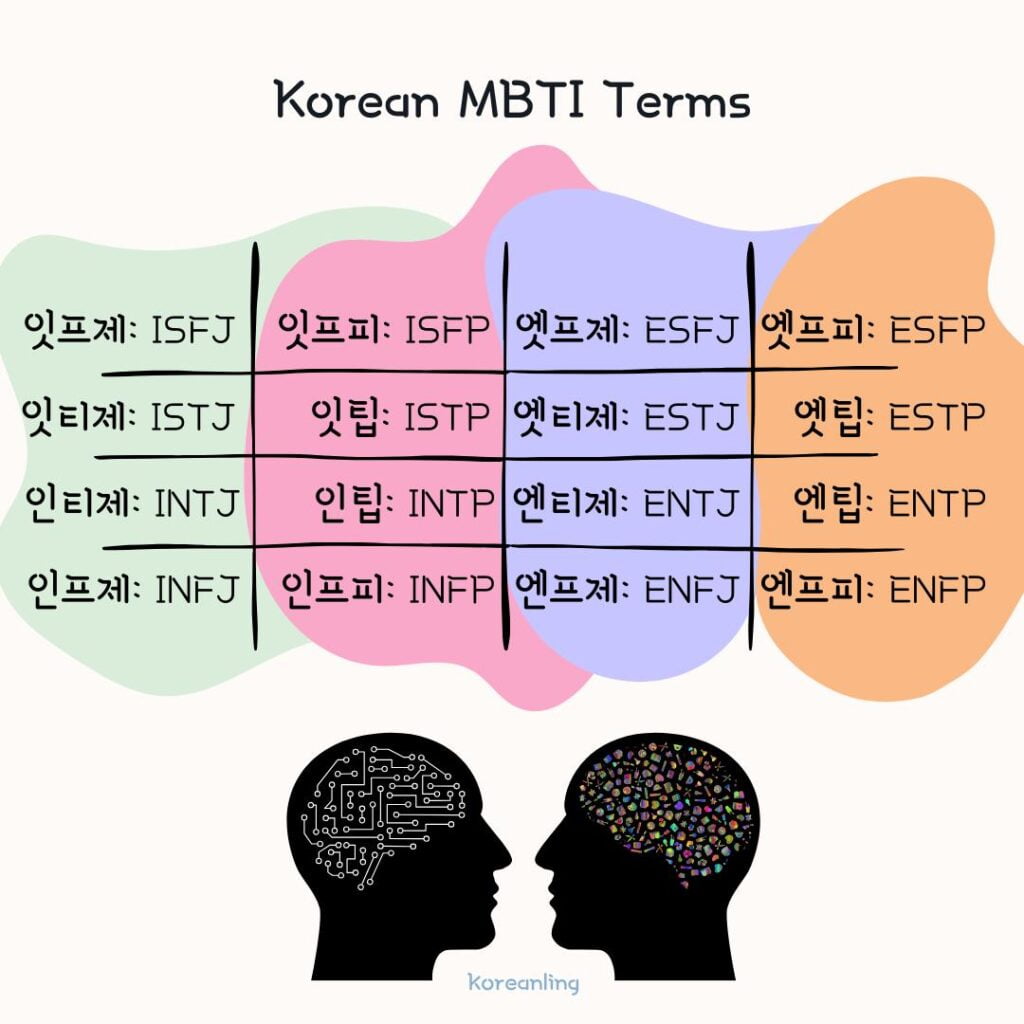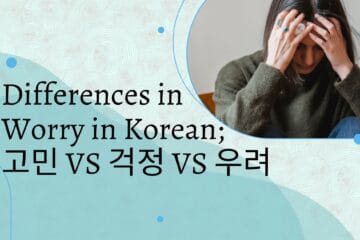If you’ve been following recent Korean cultural trends you may have heard of Korean MBTI being adapted and gaining huge traction. While the trend of MBTI seems to have calmed down here, it is going strong in South Korea. With many people even making judgment calls on people based on their type!

What is MBTI?
First as an introduction, MBTI comes from the Myers–Briggs Type Indicator which is a personality quiz to sort people into 1 of 16 types; all based around a combination of 4 letters. First established around 1944, the personality typing has been refined throughout the years.
Either you are extroverted or introverted, and that makes up the first letter in your type, and so on. It goes from E or I (Introverted vs. Extraverted) N or S (iNtuitive vs. Sensing), T or F (Thinking vs. Feeling), and finally J or P (Judging vs. Perceiving). I’ll run through the meaning and definitions of each of them quickly at the end later, so let’s look at why South Korea adopted it!
South Korea and Personality Types
Before MBTI there were blood types. People in Korea and Japan adapted using someone’s blood type to determine personality. Types A, B, AB, and O had certain characteristics attached to them. So even before MBTI was adopted Koreans loved attaching certain types and attributes to define people.
The blood type personalities have been big for a while. Supposedly, since around the early 2000s, and even getting a webcomic inspired by them around 2013 (A Simple Thinking About Blood Type : 혈액형에 관한 간단한 고찰), which has been turned into its own anime!
MBTI picked up in South Korea around 2020, initially with couples or friends using it within their groups but has expanded far out now. It has been debated it picked up because Koreans culturally are more likely to attach and really love these certain things; blood type personalities, Korean zodiac signs (which are similar to the yearly Chinese yearly zodiac, not the Western monthly one), and now MBTI.
These personality types let people explore themselves and their personalities. Even though it can feel limiting to some to only have 16 options, it’s more acceptable and comforting I feel in a collectivist society like South Korea than in an Individualist one. Korea can be very trend and group-focused so many feel wary of standing out or being too different. So some are reluctant to explore what makes them an individual and their own perspective, feelings, or actions.
I think its rise is a combination of people using it to comfortably get to know themselves better while still having that collective group feeling (sort of like “I’m ISTP so I feel connected with others in the same type and who share common letters”). And it becoming popular feeds into the popularity; once it’s on the rise then everyone feels the need to do it and adapt. Then the fringe people who haven’t yet taken the quiz feel forced because it’s included in the job market and everywhere on TV and media.
What is the Korean MBTI Culture?
When I said people make judgment calls based around MBTI I wasn’t joking or exaggerating! Korean MBTI pretty rapidly picked up in popularity and one survey even reported that almost half the population had taken the test by the end of 2021.
The test has since expanded out to universities and the job market, with positions asking people for their test results and making hiring decisions based on them. Which has been frustrating to many job seekers saying it’s unrelated to their capabilities for a job.
Of course, it’s expanded into popular media as well. Multiple K-pop groups and singers reference MBTI in their songs (NCT Dream – ISTJ, IVE – Either Way, etc.). And celebs and personalities will talk about their type and others’ MBTI type on TV.

What are the MBTI types?
As I mentioned before, the types are built up of a combination of 4 letters. Either you lean more towards extroverted or introverted, and so on. I’ll run through each of them quickly:
Introverted vs. Extraverted
This is based on how you get energy. Introverted people gain their energy back when by themselves, and can feel drained out in social situations. Meanwhile, extroverted people gain energy in social situations and generally prefer those over solo activities. They are more likely to enjoy being the center of attention.
Now this has nothing to do with shyness; an extroverted person can be shy, and an introverted person can be a social butterfly. It’s just that the introverted person will need a break, and want some time to feel ready to go out and be social again.
Intuitive vs. Sensing
How do you take in information and see the world? N people are open-minded, and curious, looking at the bigger picture, and enjoying new concepts and ideas. S people focus on the details and like facts much more. They perceive the world more literally, meanwhile, an N can see it more poetically.
Thinking vs. Feeling
This is centered more around how you make decisions and deal with emotions. Are you more logical or emotional? T people are more likely to focus on reason and logic to guide them and value being level-headed. For F people they will focus more on social harmony, your values, and how an action can affect another, they value being more empathetic.
Judging vs. Perceiving
The final letter is determined by your approach to work and planning. If you prefer a solid plan, strict deadlines, and having matters settled then you are more in line with J type. For P types they like going with the flow more, and seeing rules or deadlines as flexible; preferring to keep their options open and loving surprises.

Korean MBTI Terms:
잇프제: ISFJ
잇프피: ISFP
잇티제: ISTJ
잇팁: ISTP
인티제: INTJ
인팁: INTP
인프제: INFJ
인프피: INFP
엣프제: ESFJ
엣프피: ESFP
엣티제: ESTJ
엣팁: ESTP
엔티제: ENTJ
엔팁: ENTP
엔프제: ENFJ
엔프피: ENFP
www.16Personalities.com is a popular free platform Koreans use, if you’re interested check it out for fun and see what type you are! Or if you have done the quiz before, maybe see if your results have changed. Though I think it’s good to take it light-heartedly, just for fun. Don’t worry too much about the results or feel stuck to them!



0 Comments